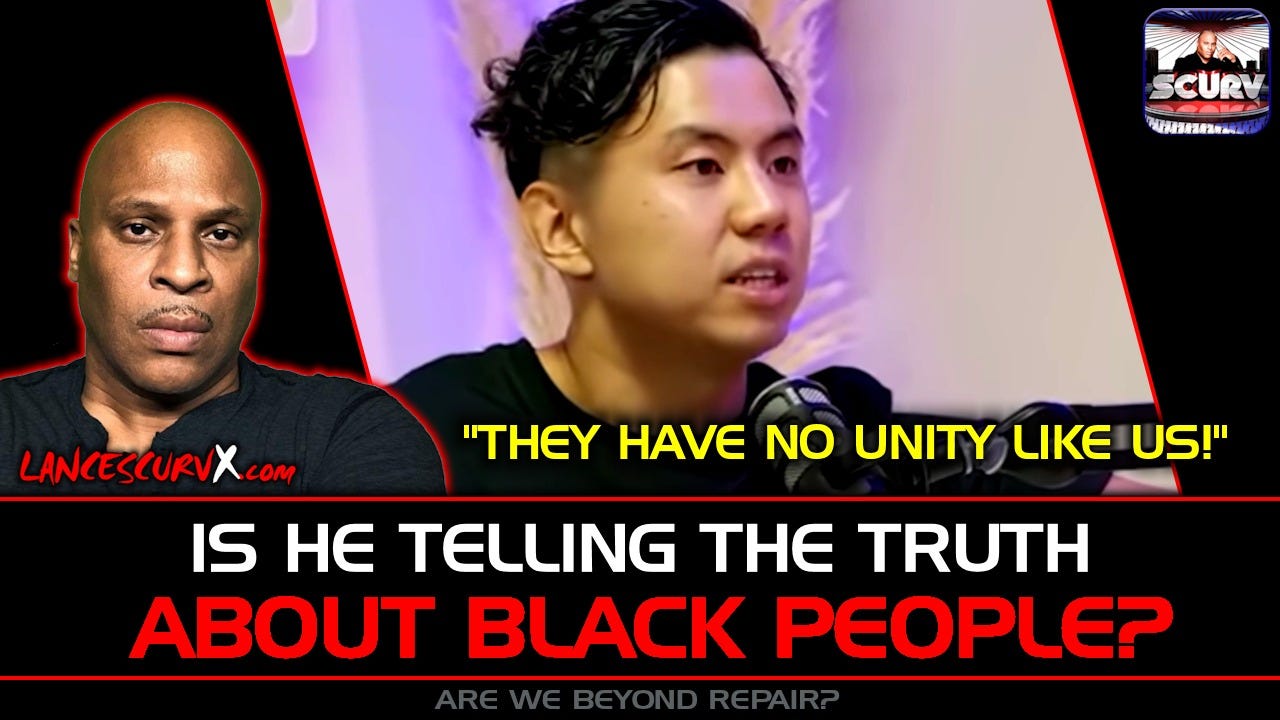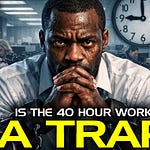When Others See What We Refuse to Acknowledge
Every once in a while, truth comes from an unexpected mouth. The other day, I came across a video of a young Chinese man in his 20s speaking about Black people — not in a hateful or condescending way, but in a tone of confusion and disbelief. He said that if Black people across the globe had the unity that the Chinese have, we would be unstoppable. He wasn’t lying. He was simply observing what many see but won’t say out loud — that for all our brilliance, creativity, and natural talent, we are our own worst enemy when it comes to building and maintaining something for ourselves.
He went further — and this is where it got deep. He said maybe Black people are missing something, a gene that prevents us from truly standing together. He said that when he sees another Chinese person, man or woman, he automatically feels a bond, a sense of duty to look out for them. That’s not a rare thing — that’s their cultural foundation. But when he looks at us, he sees the opposite. We tear down, we envy, we divide, and we do it with precision as if it’s built into our DNA.
That statement — about a “missing gene” — hit me hard. Not because I believe we literally lack one, but because it feels like that’s the only explanation left when you watch how easily we sabotage each other while others move in silent harmony.
The Gene of Disunity — Learned or Engineered?
Let’s be real: there’s no scientific gene that makes Black people hate each other. But there is something that’s been embedded into our consciousness so deeply that it operates like one. Centuries of slavery, colonization, and mental conditioning didn’t just beat our backs — it rewired our instincts. Somewhere along the way, we started to believe that the brother next to us is our competition, not our comrade. We were programmed to see each other as enemies in the race to the bottom, while every other group looks at each other as a resource, a reflection, and an investment.
When we get a little bit of success, we start looking down instead of reaching back. When someone shines, we find ways to dim their light. When we finally get the chance to build something of our own, we fight over who’s in charge until the whole thing collapses. That’s not a gene — that’s conditioning passed down through trauma, reinforced by media, and maintained by ego.
How Others See Us — And Why They Keep Their Distance
The painful truth is that other groups study us like a textbook. They admire our strength, our culture, our rhythm, our innovation — but they also watch how we turn on each other. They see that we’ll buy from everyone but ourselves. They see that we’ll dance, sing, and entertain for their dollars but won’t support our own platforms with the same energy. They see that when a Black person tries to rise up with integrity, we’re often the first to drag them down.
So when a Chinese, Arab, or Jewish businessperson comes into a Black neighborhood, they already know what to expect. They know we’ll spend our money there faithfully, and they know we won’t unite to create our own. They don’t even need to fear competition — we’re too busy arguing over who gets the credit.
It’s not racism keeping us divided at this point — it’s the poison of self-hate that’s been fermented inside of us for generations. Other groups can’t fix it. Only we can.
We Work Hard — But Not for Ourselves
This part burns the most. We’ll go to work for another race and give them everything we’ve got. We’ll show up early, stay late, smile through disrespect, and defend the company like it’s our family name. But when it’s time to work for ourselves — when it’s time to build something Black-owned — the discipline disappears. Suddenly we cut corners, we argue, we lose motivation, and before long, the same project we once praised falls apart.
Why? Because deep down, we still don’t believe in us. We’ve been taught that validation only counts when it comes from the outside. That’s why a job under someone else’s control feels safer than a dream that’s ours. That’s why our communities stay underdeveloped while our labor builds the world. It’s not a lack of ability — it’s a lack of trust in our own collective power.
The Trap of Individualism
Every strong culture operates with a sense of “we.” But too many of us operate with “me.” We’ve mistaken survival for success, and competition for progress. We’re busy flexing on each other instead of building together. We’ve become so focused on being the “only one” that we’ve forgotten the strength in being “one of many.”
Look at the Chinese, the Indians, the Arabs, the Jews — they don’t move as individuals. They move as units. They might have internal disagreements, but they keep it in-house. Meanwhile, we air everything out in public, we cancel our own, and we glorify betrayal as if it’s a form of freedom. That’s not strength — that’s dysfunction dressed up in pride.
The Sweet Talk of Unity — and the Bitter Taste of Reality
Every time we start talking about unity, it sounds beautiful. We say all the right words, make all the right speeches, and hold all the right meetings. But the minute egos collide or money gets involved, everything falls apart. We don’t have to be taught how to destroy what we build — we do it naturally.
It’s like we’re addicted to starting over. We talk about building Black Wall Streets, but we can’t even maintain small partnerships without suspicion, gossip, and backstabbing. We want revolution, but not responsibility. We want liberation, but not accountability. We want progress, but not the discipline that comes with it.
Are We Damaged Beyond Repair?
That’s the question I asked at the end of my video. Are we so damaged that we can’t fix this? Are we like a totaled car — written off, too expensive to restore? I don’t believe so. But I do believe that repair requires pain — the pain of honesty, the pain of humility, and the pain of change.
We’ve got to reprogram the way we see ourselves and each other. We’ve got to stop expecting unity to fall out of the sky and start practicing it in our daily lives. We’ve got to hold each other accountable — not just for failure, but for success. We’ve got to stop being suspicious of love and loyalty and start seeing it as our natural state again.
The Power We Keep Throwing Away
The Chinese brother wasn’t wrong. If we ever learned to move with one mind, one purpose, and one heart, we’d shake the world. But until we stop fighting ghosts from our past and demons in our own hearts, we’ll keep building empires for everyone but ourselves.
We don’t lack a gene — we lack genuine love for each other. Until that changes, we’ll keep spinning our wheels in the mud, mistaking movement for progress.
But the moment we wake up — really wake up — and decide to see each other as extensions of ourselves, that’s the moment the world shifts. Because when Black people love each other for real, there’s no force on Earth that can stop us.













